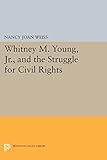Whitney M. Young, Jr., and the Struggle for Civil Rights / Nancy Joan Weiss.
Material type: TextSeries: Princeton Legacy Library ; 993Publisher: Princeton, NJ : Princeton University Press, [2014]Copyright date: ©1990Edition: Course BookDescription: 1 online resource (314 p.)Content type:
TextSeries: Princeton Legacy Library ; 993Publisher: Princeton, NJ : Princeton University Press, [2014]Copyright date: ©1990Edition: Course BookDescription: 1 online resource (314 p.)Content type: - 9780691601311
- 9781400860234
- 323/.092 B
- E185.97.Y635 -- W45 1989eb
- online - DeGruyter
- Issued also in print.
| Item type | Current library | Call number | URL | Status | Notes | Barcode | |
|---|---|---|---|---|---|---|---|
 eBook
eBook
|
Biblioteca "Angelicum" Pont. Univ. S.Tommaso d'Aquino Nuvola online | online - DeGruyter (Browse shelf(Opens below)) | Online access | Not for loan (Accesso limitato) | Accesso per gli utenti autorizzati / Access for authorized users | (dgr)9781400860234 |
Browsing Biblioteca "Angelicum" Pont. Univ. S.Tommaso d'Aquino shelves, Shelving location: Nuvola online Close shelf browser (Hides shelf browser)

|

|

|

|

|

|

|
||
| online - DeGruyter Love and Beauty / | online - DeGruyter The Politics of Earthquake Prediction / | online - DeGruyter Benjamin Silliman : A Life in the Young Republic / | online - DeGruyter Whitney M. Young, Jr., and the Struggle for Civil Rights / | online - DeGruyter A Fragile Power : Scientists and the State / | online - DeGruyter The Gene Hunters : Biotechnology and the Scramble for Seeds / | online - DeGruyter The Didactic Muse : Scenes of Instruction in Contemporary American Poetry / |
Frontmatter -- Contents -- Illustrations -- Preface -- Acknowledgments -- Prologue -- I. Growing Up at Lincoln Institute -- II. Kentucky State -- III. World War II -- IV. St. Paul and Omaha: Early Years in the Urban League -- V. Atlanta: Social Work and Civil Rights -- VI. A Year Off and a New Job -- VII. Leader of the National Urban League -- VIII. The Civil Rights Movement -- IX. The Corporate Establishment -- X. The Kennedy and Johnson Administrations -- XI. The Strains of Celebrity -- XII. Rlack Power -- XIII. The Nixon Administration -- XIV. Doubts, Pressures, Prospects for the Future -- XV. Lagos -- Epilogue -- Abbreviations -- Notes -- A Note on Sources -- Index
restricted access online access with authorization star
http://purl.org/coar/access_right/c_16ec
Whitney M. Young, Jr., the charismatic executive director of the National Urban League from 1961 to 1971, bridged the worlds of race and power. The "inside man" of the black revolution, he served as interpreter between black America and the businessmen, foundation executives, and public officials who constituted the white power structure. In this stimulating biography, Nancy J. Weiss shows how Young accomplished what Jesse Jackson called the toughest job in the black movement: selling civil rights to the nation's most powerful whites. With race at center stage in American national politics, Young brought the National Urban League into the civil rights movement and made it a force in the major events and debates of the decade. Within the civil rights leadership, he played an important role as strategist and mediator. A black man who grew up in a middle class family in the segregated South, Young spent most of his adult life in the white world, transcending barriers of race, wealth, and social standing to advance the welfare of black Americans. His goals were to gain access for blacks to good jobs, education, housing, health care, and social services; his tactics were reason, persuasion, and negotiation. He understood keenly the value to the movement of creative tension between moderates and militants, and he took good advantage of that understanding to promote his aims. Andrew Young said of Whitney Young that he knew the "high art of how to get power from the powerful and share it with the powerless." How he managed that, and with what consequence, is the central theme of this book.Originally published in 1990.The Princeton Legacy Library uses the latest print-on-demand technology to again make available previously out-of-print books from the distinguished backlist of Princeton University Press. These editions preserve the original texts of these important books while presenting them in durable paperback and hardcover editions. The goal of the Princeton Legacy Library is to vastly increase access to the rich scholarly heritage found in the thousands of books published by Princeton University Press since its founding in 1905.
Issued also in print.
Mode of access: Internet via World Wide Web.
In English.
Description based on online resource; title from PDF title page (publisher's Web site, viewed 30. Aug 2021)


